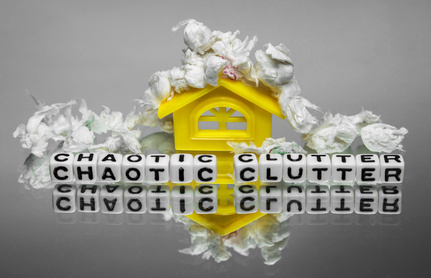Clutter: A collection of things lying about in an untidy mess.
It’s a simple definition, but clutter can have enormous costs associated with it, both tangible and intangible. My clients with clutter issues call me for help because they have finally decided that the costs are too high and they don’t want to pay them anymore.
These are the top ten costs of clutter for my clients:
- Time and energy spent looking for items they can’t find
- Anxiety and stress over not being able to find things (especially paperwork) when they need them
- Wasting money buying duplicates or even triplicates of items they know they already have but can’t find
- Decreased productivity due to lack of work space or inability to find what they need to do their work
- Wasting a lot of money on storage units to house all the extra items they can’t fit into their clutter-stuffed homes (see my previous blog post on Storage Units)
- Paying late fees and interest penalties because they often don’t find bills until after their due dates
- Throwing away expired food because their refrigerators and pantries are so full, they can’t actually see what they have
- Embarrassment from not being able to invite friends and family over because of all the unsightly clutter
- Worry over health issues, especially for those with chronic illnesses due to mold, dust, and germs from built-up clutter
- Danger of tripping and being hurt from too many items lying around the house.
This is why clutter is such an important issue for so many Americans today.
I know that when I try to work in a cluttered environment, I get overwhelmed and stressed out. It’s almost impossible for me to be productive if my desk is not cleared; in a way, the physical clutter causes correlating mental clutter in my brain. If I work in a severely cluttered office of a client, I often leave with a headache – I can only imagine what living in such an environment every day does to them.
Do you live with clutter? What do you think it costs you? Are you ready to give it up? Making the decision to de-clutter is the first step you need to take if you’re serious about achieving a more organized life.



10 thoughts on “The cost of clutter”
I totally agree. It costs me time looking for things. Energy trying to find things and thinking about where I put things. And, money I need to spend to buy another one.
So true – and don’t forget frustration when you know you have it but can’t find it!
I think my clients would have a similar list. Isn’t it weird that things we buy, with money we’ve worked hard for, can end up hurting us in these ways?
Yes – it’s really an ironic fact Seana!
Time and energy are truly the #1 cost to me. It’s using up your most precious resources. That alone is a compelling reason to get organized!
It’s so interesting that a lot of clients need to see money being wasted before time and energy before they will take action! But many times, it’s the combination of many of these costs that spur them to action!
Great list and all of them are sad reminders of the cost of clutter. Thanks for the post!
Thanks Liana!
Great list Penny! Clutter is wasted money and wasted time! I used to believe I was saving money by keeping things I may need but then I heard The Minimalists say, “Anything we get rid of that we truly need, we can replace for less than $20 in less than 20 minutes from our current location.” So you could use whatever formula you like but it’s a great rule of thumb.
Love it Autumn! I will definitely use that with my clients!